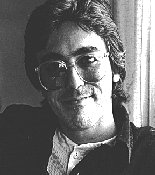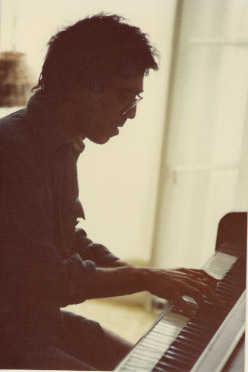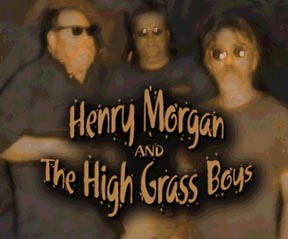|
|
 |
|
|
Frank Cotolo........a man with many hats. I first ran
across Frank a year or so ago and I became intrigued. The
more I found out about him, the more intrigued I became. His
music seems to be as multi-hatted as his personality
and I've enjoyed both quite a bit. I recently asked Frank
a lot of questions ranging from his stint with Wolfman Jack to
his thoughts on the internet to his literary
influences.
|
|
Can
you give me a quick synopsis of your musical history?
I
learned guitar, made up songs, started a band, played
cover tunes, learned piano and harmonica, made up songs,
played original tunes, dabbled in recording, made up
more songs, got some published, played with a club band,
made up more songs, etcetera. |
I
know a bit about your show business past too. Could you
talk about that a bit?
In
Hollywood I became a professional writer and wrote for
just about every medium to make a living. I didnít
have any hits, per se, but I worked professionally on
radio and TV shows, commercials, movies and some
theater. I even acted a bit. Eye-blinking parts. Once I
hooked up with Wolfman Jack I got into the Hollywood
inner circle and opportunities to write for money became
easier. |
|
 |
In 1978, what happened to cause you to leave New
York for California?
Me and a partner had a business in New York selling
jokes through the mail to disc jockeys. The
business got hot and we made enough money to try to hit
the big time, so to speak, and that meant going to
Hollywood.
|
Did you know in advance you would work with Wolfman
Jack or did that come about after you got to Hollywood?
After. I was practically living on the streets
in Los Angeles because I wasn't making the right
connections. My partner had gone back to New
York. Then I answered an ad for a writer, not
knowing it was for the Wolfman. And out of
hundreds of submissions, he chose two. I wound up
one of the two he liked and hired.
|
|
What
exactly did you do with Wolfman Jack?
Over
the course of my relationship with him I wore many hats.
I was, first and foremost, his writer for just about
every function and medium in which he performed. When he
did a syndicated radio show, I wrote it. When he needed
jokes or banter for a live appearance, I wrote it. Even
book intros and celebrity additions to novelty books.
You name it, I wrote it.
I
also produced some syndicated radio programs and became
his on-air ĎA-man-Charlie.í I would do characters
and be his foil for jokes. And on the road I served many
purposes, from liaison to writer to confidant. I
accompanied him when he shot TV and film parts and was
always there to help him say something, if not the right
thing, you know?
|
 |
You
are also a published author. I looked up a book once and
was pleased to see it was written by you. I poked around
a bit and found you'd written two books.
Yes.
One is a book of short stories called ďPony Player.Ē
They tell me itís a cult classic but it actually made
a few bucks. Most cult classics donít make money until
fifty years after they are published. My second
published book is a textbook on handicapping race
horses. I made money on that, too.
|
|
Are
there more?
Not
published, but there are more on the shelves. I have been
working on getting one edited for some kind of
distribution. Itís a novel called ďFlies To Wanton
Boys.Ē
|
How
did you come to write them?
My
book of short stories is based on a time in my life when I
mostly gambled on horses to make a living. A small
publisher in Texas loved it and published it. The second
one came about when I began working as a sports
journalist. |
|
You
strike me as someone who generally does what he wants
and does it how he wants to do it. How is it you are
able to do that these days when a lot of people seem to
NOT be able to do what they want or at least not how
they want to do it?
Youíre
right, I am like that. But anyone who wants to be like
that has to realize there is a big price to pay for it.
Iíve had two unsuccessful marriages, fought off drug
and alcohol addiction, had a nervous breakdown and
battled every demon tooth and nail to find any kind of
peace of mind. I think people who do things they donít
like arenít willing to pay the price that comes along
with it. Iíve always been a risk-taker, but not
without calculation or preparation for the
consequences.
|
When
you moved from California, why did you pick a rural
place to move to?
I left California for Nashville, where I wrote
for the Nashville Network and ran Wolfmanís country
music show over the TNN radio network. I got canned when
they booted Wolfman from the network. Thatís when I
decided I had had it with show business. So I picked up
a journalism gig that was based in rural Pennsylvania.
Work brought me here but I am glad it did. I am sick of
cities and it ainít nowhere to raise children.
|
|
Tell
me about Cool Noise Studios. What is it (equipment
etc.), and is it just for you or do you have others come
in and record there?
It
was a name I used when I began recording in the 1960s.
Back then I had just three reel-to-reels and a violent
sound environment. So, I knew there was noise, but it
was cool. So, in the mid-1990s, when I decided to end a
long hiatus from writing and recording music, I decided
to use the name again.
I began with a Tascam four-track cassette portostudio,
some Shure SM 58s, a compressor and a Zoom effects unit.
I got an Alesis amp and reference speakers, headphones
and all sorts of wires and played catch-up. I hadnít
recorded anything for going on 20 years, you see, and
back then I was using, at best, a Teac sound-on-sound
machine. I had percussion toys, a drum set, a Rogue
bass, a Gibson Country Western acoustic, circa 1967, a
Gibson SG electric and then I got two Fenders, a Strat
and a Telecaster and a Danelectro. Then I picked up a
Alesis keyboard synthesizer. Eventually I added an Akai
12-track digital machine, SoundForge mixing software and
began to realize I had far too much stuff, so I stopped
adding gear.
|
And
what are your roles there, do you play, record, engineer
and master all yourself?
Unfortunately,
too many times I play the major roles, yes. But as much
as I can, I get new and old friends to come by and play.
I always produce because I am, simply, the only one of
all my friends, at least, who knows how to get the most
out of this hardware. That is primarily because one of
the first things I do is toss out the manuals. All
manuals do is tell you your limitations and I never want
to feel like I am stuck. I know my own limitations,
those are enough.
Like
before I had unlimited tracking ability with digital, I
created a procedure to bounce up to 12 tracks on a
four-track cassette deck, something the manufacturers
said couldnít be done without making a track muddy and
unclear. I managed to post productions of this sort on
the internet and no was the wiser that these tracks were
analog, no less pushed-to-the limit creations.
Cool
Noise Studios has also done outside work, with other
artists. We produced the first CD for a comic book and a
45-minute cassette of poetry and music. Also, I produced
an upcoming CD by my friend Dom Cimei, called
ďWhatís Up Is Whatís Down,Ē which will be
available at Ampcast.com soon.
|
|
What
is your feeling on the internet and the modern musician.
Do you see the internet as a necessary tool, or a lure
down the garden path for indie artists?
Itís
not a matter of being necessary any longer; itís one
of the obvious things that go along with the whole
musician deal. If you are younger and you have grown up
in the digital world, then you donít ask the question,
ďShould I put my material on the internet? Should I
have a website?Ē You just do it. Itís second nature,
now.
But we have learned that though the internet is
a great tool to get exposure, it is hardly a gold mine
of marketing. Independent artists hoping to sell music
over the internet are currently doomed. The internet is
making some progress as a shopping
place, but not with
music. Anyone selling music over the internet is
suffering. It appears now that no one wants to pay for
music, by majors or independents, in great numbers, from
the internet. Remember, Napster had millions of
subscribers because everything was for free. No on-line
music distributor has been able to produce those kinds
of numbers by charging for music.
|
If
you could talk to David Byrne about rare African art or
David Lee Roth about drinking beer, which would you
choose and why?
I would talk to Byrne about African art,
something I know little to nothing about. But I imagine
it would be a hoot, if he had half a sense of humor,
which I donít know. I have had the opportunity over
the years to talk to a lot of personalities and always
the most fun conversations were those that had little to
do with the direct issue of their celebrity. I once had
coffee with Dudley Moore and we talked about the
craziest things and laughed together like we knew each
other for years. The subject of his fame never entered
the conversation. Also, I have very little to say about
beer to anyone, no less that Roth guy.
|
|
I
was reading somewhere that your early musical influences
were not rock, but were classical and film music as well
as music from the 1920s-1940s. Does any of the classical
creep into your writing or playing?
Yes.
I am not classically trained but I am a sucker for
Mozartís melodies and arrangements and they were
rolling around my head during the years I first heard
Gene Autry and Roy Rogers. I was a TV baby from the Baby
Boomer generation, so music was always there in shows
and on the radio. Leroy Andersonís work moved me as a
kid. There was something special about pieces like
ďThe TypewriterĒ and ďForgotten DreamsĒ and
those melodies stuck with me. Later, when I began to
compose music, I lifted some of those changes and
recalled the way instruments moved in Mozart pieces.
|
 |
Did
you ever play classical music at all?
I
was never good enough to actually play the classical
stuff, but I managed to use the classical feel in much
of my older pop stuff. So in the Ď60s and Ď70s a lot
of my material stuck out from what my peers were
creating because my foundation of creation was based on
the masters, not the rock and rollers. But I never
abandoned the simple roots, the cowboy musicónot
country, per seóand today I aim for simple music and
poetic lyrics.
|
|
You
spent years working in radio, so you know the ins and
outs of it. Have you spent much time or energy trying to
get your songs played on commercial radio?
None. Itís a waste of energy as I see it.
Besides, my first and foremost motivation with music is
to create it. I am prolific and I take advantage of
that. It is more important for me to create than to
distribute. I know that sounds snobby, but all the joy I
get from music is at the writing and playing/recording
levels. Besides, very little of what I do is commercial,
so trying to get it played on commercial radio is like
trying to find my way to an avenue walking down a
dead-end street.
|
What
are your thoughts on commercial radio these days? I've
certainly hear a lot of criticism from people about what
commercial radio is playing.
Commercial
radio is playing whatís popular. That hasnít
changed. If you donít like whatís popular, you
donít listen. End of story.
|
|
What
do you think about it as someone who was involved in it
during a great and happy time?
I
donít think there ever was a happy time. Maybe the
kind of radio Wolfman first did, you know? And all of
the old renegade stations, like Radio Caroline in
England. But commercial radio has always been just that.
Believe me, the format and entertainment comes second to
the money game. And it was like that even when you liked
all the commercial product.
|
What
radio do you listen to?
These
days, little. Talk radio and news now and then.
Sometimes a PBS show on traditional folk or classical.
Nothing else.
|
|
I know that you are doing your own internet radio
shot on Ampcast.com now. What is that all about?
The
Ampcast show, Cotolo
Chronicles, is the only live one-man talk show on
the web. That makes it special and a piece of history. I
admire anyone doing something on the cutting edge of
things and this show is my opportunity to get in on a
medium at the ground floor and do what no one else is
doing. Or can do.
Jim
Waskowich at Ampcast chased me for months to do this
show and I began to realize that he was pioneering
something that years from now would be looked back upon
and recognized as a trailblazing effort. I want to be a
trailblazer, and it would be wonderful to be one of
those guys people look back upon decades from now and
say, ĎHe was the first to do this!í But thatís not
a goal, mind you. I love doing the show because I have
the ability to talk and cavort for two straight hours
and keep an audience interested, informed and
entertained. And it and itís a whole mess of fun. My
opinions about the entertainment business, indie or pro,
are not popular but Ampcast gives me an arena to express
them. Thatís quite a gift. I get to address the other
side of things, be the loyal opposition and muck up the
pulp that the public all too often swallows as the
truth.
|
 |
|
|
|
A
lot of people say to be successful in music you have to
play live. As someone who doesn't play live what are
your thoughts on that? Are you successful and therefore
the exception that proves the rule or is that idea a
bunch of hogwash?
Itís
true, you have to. Certainly as an independent artist
you have to play live. Thatís where you would get the
most CD sales. As for me, I am going to be playing live
again. I have a trio now, Henry Morgan & The High
Grass Boys and I have the kind of material that can be
presented live. Of course we will give our CDs away, to
the extend that we can afford to do so.
I
am an utter failure by the standards of the music
industry. In the meager world of on-line communities I
have not done nearly as well as most.
|
 |
|
I
recently heard you talking about giving away the music.
In general I agree with you on that too. I've heard some
people say that when we indies "give away" our
music, we're hurting ourselves and others by showing the
industry and the public that our music isn't worth
buying. What do you say to that idea?
I
say that anyone who feels like that is dealing with two
problems. The first is fear. The second is ego. These
people must still harbor some hopes that they will
become sellable properties or else they wouldnít
protect their music with a monetary value. They donít
want to look cheap. Itís a stigma. Itís amazing to
me how people who cannot sell their music are so
protective of it. I think, also, they hide behind the
money because maybe no one wants their music even if
itís free. Thereís a concept bound to crumble a few
egos.
Look,
I donít care what I show ďthe industryĒ or ďthe
public.Ē I donít even know who these characters are,
do you? As far as I am concerned, the world doesnít
need one more piece of music, no less any of mine. So if
someone is interested in my
music, I let Ďem have it.
If I can afford it, I will send you anything you want to
hear. Whatís important is that you want to hear it,
not that I look cheap or like an amateur for not
charging you for it. Someone on the internet called me
an amateur for doing this. Me? I have made more money in
show business than most people in this independent
artist game could in three lifetimes. I have been paid
to write music and I have had music published. I have
nothing to prove. I am free of all the ego-burdening
bullshit.
|
A
lot of bands have their own CDs nowadays. What impact do
you think this has on the music scene in general?
Whatís the difference how many CDs
there are available if no one is listening to them? For
money or for free? As I said, there is far too much
music available, no less taking into account personal
tastes. More than half of the people making CDs these
days are doing it because they can. Period. Itís part
of the landscape now. None of them, however, make a dent
in the stream of pop culture.
|
|
Your
project The King Of Monkey Island (KOMI), I think I
would call a concept album. I'm awfully fond of concept
albums myself, my last one was a concept album even. Do
you have any sort of hope that some listener will hear
KOMI and have a big light bulb come on over their head
and understand what you're saying with the album? Or if
that light bulb doesn't come on, does that matter to
you?
|
 |
| KOMI
is a no-brainer. It speaks to listeners at a gut level.
Itís not meant to ignite a light bulb. I am not a guru
or a preacher and Iím not trying to enlighten anyone.
You
see, the circus of creativity in my mind is a raw and
childish thing. All childish things come from the heart
and thatís where KOMI comes from. It is a bridge
between a childish heart and a fifty-three-year-old
head. Itís where the adult and child meet, accept one
another for who they are and go on with life
negotiating. Everyone wants to build that kind of a
bridge and walk over it without the fear of falling.
KOMI
music should make listeners feel good, is all. And when
you feel good and you are at peace, you are healthy,
wealthy and wise. You donít need for anything or
anybody. If someone doesnít receive any good feelings
after listening to KOMI, thatís all right with me.
Because I am the King of Monkey Island, get me?
|
 |
Do
you think the public differentiates between indie music
and non-indie music?
I really donít know. The so-called public, the
demographic out there with the buying power, is an alien
race to me.
|
You
are a word man. I imagine literature plays a large part
in your thinking and writing. I know they do in mine
anyway. What are some of the authors or works that most
often run through your head?
Nothing
plays a more important role in my music these days than
does the lyrics and being a ďword manĒ I am always
inspired by certain sources of literature. Anyone who is
well-read can read through my lyrics and pick them apart
with references, phrases and images from my sources,
which run the gamut. Thereís Henry Miller, Thomas
Hardy, Max Shulman, John Fante and Charles Bukowski.
Thereís Shakespeare, Robert Service, Alan Watts, the
New and Old Testaments, James Thurber, Groucho
Marxówho was an excellent writeróJoseph Conrad, S.J.
Perelman; the list goes on and on.
So,
you see, there is an endless stream of words and music
in my arsenal based on having a sound foundation of
being exposed to expression. If I have any critique
about any music I hear from majors or indies, it is that
far too much of it has no substance when it comes to
self-expression. Most songwriters seem to ignore the
literal side of songwriting. They hear clichť and use
clichť. And they have not learned to write well enough
to have earned the right to corrupt the language into
poetic form. |
|
Do
you think artists, musicians in particular in this case,
have any sort of responsibility to the music or to the
public? Obviously, do the best job you can with a song,
but is there more, do you think?
Responsibility
is not in the equation as I see it. The moment you feel
you have to do what anyone else wants you to do, you
sabotage your ability to create with any acumen, no less
emotion. If you are lucky, you attain an audience of
some number and they appreciate what you do, and
thatís what you do for them. The bond you have with
your music is the relationship you have with your
expression and that needs to be nurtured, just as it
does with any human relationship. You have to grow and
keep growing. Itís a natural thing, it just happens.
Unless you stop and say, ĎHey, I better do it this way
or else no one is gonna listen.í
|
Looking back on it all, what's the most favorite
thing you've done, either professionally or as a part of
normal life?
Thereís
a problem answering this. I have done and continue to do
so much that I love to do that it is impossible to
isolate one thing and evaluate it as the best. The
creative process has always been the engine of my
machine, though. When I am creating anything I am
totally in that moment, embraced by the joy of it. Then
again, itís the same feeling when I frolic with my
kids or during a rare moment of privacy with my wife and
me. As for my history, I have enjoyed more of what I
have done in every aspect than I regret about any of it.
|
|
|
|
|